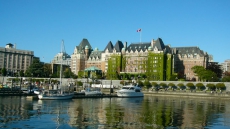MONTREAL — Terry Dickinson remembers being five years old, stepping outside his parents' backyard in Toronto and staring in awe at the Milky Way and thousands of stars.
The 71-year-old astronomer recently returned to his childhood home and was saddened he could no longer enjoy the nocturnal beauty because of pollution caused by bright city lights.
To enjoy the kind of view he took in as a child, Dickinson says he would have to drive at least two hours north of Toronto.
"So, we're talking about not a subtle change," he said in a recent interview. "It's a colossal change — a total change, from seeing countless stars to seeing a handful."
Dickinson says young people living in large metropolitan centres today are being deprived of the majesty and wonder of the night sky.
"It just isn't there, it's been beaten back by the lights of civilization," he added.
Fighting such pollution has proven an uphill battle for Dickinson and other astronomers who have tried for years to get municipalities to reduce pollution from street lights.
What has been particularly frustrating is the switch to cheaper, but brighter light-emitting diodes (LEDs).
Robert Dick, a member of the Royal Astronomical Society of Canada, has been spearheading a committee aimed at reducing bright-light pollution.
The problem, he said, is that city officials have been told by sellers the lower-cost LEDs "are the best thing since apple pie."
"What they end up doing is buying extremely bad lighting that actually increases by literally a factor of two to three the amount of light pollution," he said.
Dick points out that LEDs decrease the ability to see at night because the white light interferes with a person's vision — with some research showing it even has an impact on health.
The Royal Astronomical Society of Canada says it has had a number of victories, however, in its battle against light pollution.
Sainte-Anne-De-Bellevue, on the western end of the island of Montreal, adopted a bylaw in 2013 that has led to 60 per cent of street lighting being changed to energy-efficient fixtures.
"It's not about the amount of light," Sainte-Anne councillor Ryan Young said in an interview. "It's about how directional the light is."
The municipality has been switching its outdoor fixtures from the round "cobra-headed" lights to "full-cutoff" street lamps that focus light downward.
That's good news for the local chapter of the astronomical society, whose nearby observatory is located in one of the rare places on the island which is still dark enough to view the stars.
The township of North Frontenac, which claims to have the darkest skies in southern Ontario, has adopted a policy to reduce its light pollution — and attract tourists to the region.
The township and almost 20 parks across Canada have been officially designated "Dark Sky Preserves" by the Royal Astronomical Society of Canada over the past 15 years.
North Frontenac, which spent $47,000 on a star-gazing observation pad and other facilities, has made astro-tourism part of its economic development plan.
Mayor Ron Higgins admits there have been mixed feelings from locals — some think it's a great idea, while others believe the money could have been better spent on other things.
But he predicts the dark-sky initiative will prove to be a huge attraction.
Ed Jager of Parks Canada noted that nine of the astronomical group's dark-sky preserves are national parks, including Alberta's Wood Buffalo — the largest in Canada and about the size of Switzerland.
He noted that the Dark Sky Preserve designation is partly responsible for bringing tourists back to Canada's national parks.
"We've seen an (overall) increase of about five per cent in the last couple of years since 2013," Jager said.
"Certainly the feedback we get from parks that put dark-sky preserves in place is that it gives them another opportunity in terms of developing experiences for visitors and promoting their park."
Five things about effects of pollution caused by bright light
— Health: Too much light at night disrupts the body's natural 24-hour day-night cycle and prevents the release of melatonin, a hormone that controls a person's sleep and wake cycles.
— Decreased security: Bright lights produce blinding glares directly into a person's eyes and create black shadows, making it difficult to see the ground and one's surroundings.
— Neighbourliness: Glare from bright lights shining into a yard or window is un-neighbourly. "Full-cutoff" fixtures direct light downward and keep unwanted light within property boundaries.
— Seniors: Lights from houses and streets make it tougher for the elderly to see when they go out at night because the transparency of an older eye is not as good as a younger eye.
— Habitats: Light shining toward wetlands or any vegetated area turns night into twilight, disrupting the lives of their inhabitants — insects, amphibians and other species. Feeding, mating and egg-laying suffer.





